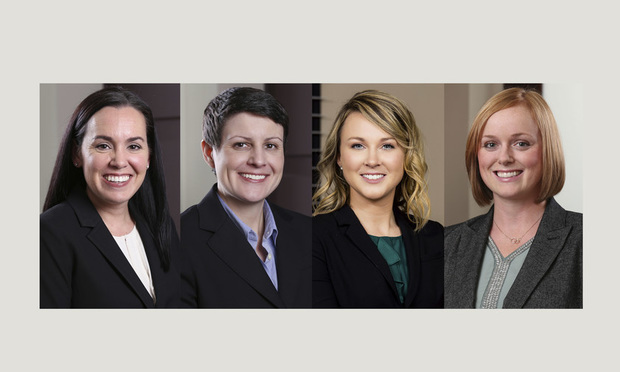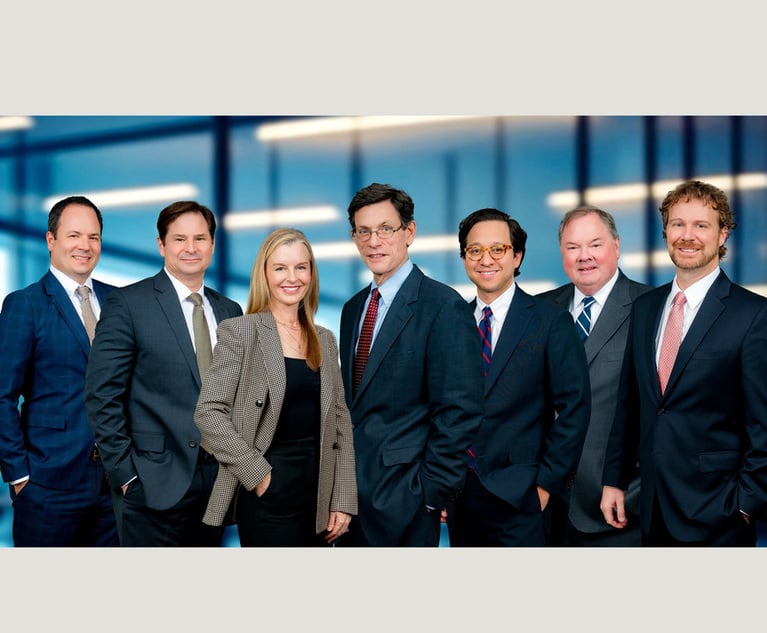Drew Eckl's First All-Women Partner Class Is Nontraditional in More Ways Than One
Jennifer Parrott, an amateur race-car driver turned trucking litigator, made equity partner after a long detour from the partnership track to the mom track.
December 06, 2019 at 04:56 PM
7 minute read
 Jennifer Parrott (from left), Vivian Fisher, Whitney Lay Greene and Melody Kiella of Drew Eckl & Farnham. (Courtesy photos)
Jennifer Parrott (from left), Vivian Fisher, Whitney Lay Greene and Melody Kiella of Drew Eckl & Farnham. (Courtesy photos)
Drew Eckl & Farnham has promoted a new slate of partners, elevating all women for the first time—including a former race car driver who took a long detour from her practice—amid a greater focus on work-life balance for senior associates.
Jennifer Parrott, the former racer, was promoted from non-equity to equity partner and Vivian Fisher, Whitney Lay Greene and Melody Kiella were named partners, effective Jan. 1, 2020. Parrott, Greene and Kiella have general liability defense practices, while Fisher represents financial institutions in loan disputes and other matters.
Drew Eckl's partnership did not overtly aim to elect an all-female class, said the Atlanta firm's managing partner, Joe Chancey, but it does point to an increased focus, as at many firms, on supporting women lawyers.
"We do a good job hiring really talented lawyers, but, like most in the industry, we've seen more attrition than we'd like—and especially with our senior female associates," he said. "We definitely identified that we wanted to do a better job of providing support for our women lawyers," he said.
Promoting from within is important to the 120-lawyer litigation defense and general practice firm, which has about 40 associates, Chancey added.
To that end, Drew Eckl started a partnership training program last January, Path 2 Partnership, to help lawyers "get past the fifth-, sixth- or seventh-year mark and into the partnership ranks," he said. The one-year program is intended for sixth-year associates and up, but some junior partners have also participated. The 2020 program has 17 participants—nine women and eight men.
Path 2 Partnership, mandatory for partnership consideration, starts with a daylong boot camp featuring presentations on how the firm makes a profit and what it takes to be an effective leader. That is followed by monthly workshops on topics such as how to run a matter smoothly.
Fifteen years ago, the traditional "up and out" law firm model meant lawyers who did not take a linear path to partnership "did not have a lot of options," Chancey said.
Now Drew Eckl lawyers can work part-time—for instance, to raise young children—and then return to the partnership track. The firm also offers a full 12 weeks of maternity leave.
Chancey added that three of the new partners, Parrott, Greene and Kiella, all with young children, helped design the Path 2 Partnership program. "Part of the story of this class," he said, "is us doing our job so that our lawyers, especially women with children at home, can balance their personal and professional lives."
Stay-at-Home Mom to Equity Partner
Parrott, the newly promoted equity partner, is an amateur race car driver turned trucking defense litigator, so she's comfortable in male-dominated environments.
But early in her career at Drew Eckl she faced a choice familiar to many women lawyers, opting to take a seven-year hiatus to raise her daughter Hannah, now 13.
Parrott, 44, said that in 2006 she'd planned just to take maternity leave, but Hannah was born two months prematurely. "I panicked," said Parrott, a fourth-year associate at the time, explaining that she felt she could not properly care for her infant daughter while performing at a high level as a lawyer.
Flex-time and working remotely were still unheard of, in large part because the technology was not there. "We were just beginning to use email," Parrott said. "Back then, you were lucky if you had the BlackBerry with the thumb-turn wheel."
Parrott's husband, Brad Parrott, now a principal in Hudson Parrott Walker, was also a young litigator with a demanding job, so she decided to care for Hannah full-time.
"I never went to the partners and asked if I could dial it back," she said. "Others did—but that was not my personality then."
When Parrott was ready to return to law in 2013, she didn't think a partnership-track job was an option after her long hiatus. She called the Drew Eckl partner she'd worked under, Bruce Taylor, for a job reference. He encouraged her to come back instead.
"Drew Eckl let me on-ramp before on-ramping was a thing, to ease my way back into practicing," Parrott said.
Fast Cars
Parrott, who was elected to equity status after making partner last year, said her focus on high-stakes trucking accident cases in her defense litigation practice is a natural outgrowth of her racing experience.
When Parrott was learning how to drive, her father, a lifelong "car nut," took an interest in amateur racing. "He sent me to race-driving school instead of having me learn how to drive while riding with friends on a Saturday night with the radio turned up," she said.
"There is no doubt that I gravitated toward trucking work partly from my love of operating a car," she said. "I know how operating a vehicle works, so in reconstructing an accident scene, it helps me focus on what the drivers were doing and how they reacted."
"Most people do not realize how close to the edge they are operating—especially in Atlanta, where people drive so fast," she added.
Parrott raced a Porsche 911 in amateur contests through college and did well.
While at Cumberland Law School in Birmingham, Alabama she was invited to compete for a spot in Road Atlanta's Petit Le Mans, a 1,000-mile race or 394 laps on the track over a maximum of 10 hours. Parrott made the cut and finished fifth in a field of 35.
There was no purse, but it was "wheel to wheel" racing against the other cars, she said. At Road Atlanta, she'd get her Porsche up to about 150 mph on the straightaway. "But it's the speed at the 90-degree corner that is where the fun is," she added.
Parrott decided not to make racing a career, but she didn't give up fast cars. Now she drives a "rather loud" BMW M3 sport sedan. "It's their fastest, loudest, gnarliest one," she said. "When I turn it on in the parking garage, sometimes it sets off the guy's car alarm next to me."
Shifting Roles
Because of her racing experience, Parrott said she's never felt out of place in the male-dominated environment of trucking litigation. "I'm not afraid to walk in a room and be the only woman there," she said.
But women in law can face a bind when they assert themselves, Parrott acknowledged. "Women sabotage themselves when they don't ask for what they want—but when they do, they risk being perceived as overly aggressive."
Asked whether that's ever been a concern, Parrott replied that she's "always conscious of my demeanor and tone in my practice—not so much with my team but with opposing counsel or a new client, like the owner of a trucking company."
Parrott must demonstrate to clients that she will "zealously represent" them, but she wants to show opposing counsel that she's "reasonable and easy to deal with."
"All good litigators are chameleons," she said, but women are more conscious of what role they're playing.
"I don't fit the mold of the bulldog lawyer," she said. "At least, not initially."
This content has been archived. It is available through our partners, LexisNexis® and Bloomberg Law.
To view this content, please continue to their sites.
Not a Lexis Subscriber?
Subscribe Now
Not a Bloomberg Law Subscriber?
Subscribe Now
NOT FOR REPRINT
© 2025 ALM Global, LLC, All Rights Reserved. Request academic re-use from www.copyright.com. All other uses, submit a request to [email protected]. For more information visit Asset & Logo Licensing.
You Might Like
View All
On The Move: Squire Patton Boggs, Akerman Among Four Firms Adding Atlanta Partners
7 minute read

Georgia Justices Urged to Revive Malpractice Suit Against Retired Barnes & Thornburg Atty
4 minute read
Law Firms Mentioned
Trending Stories
- 1ACC CLO Survey Waves Warning Flags for Boards
- 2States Accuse Trump of Thwarting Court's Funding Restoration Order
- 3Microsoft Becomes Latest Tech Company to Face Claims of Stealing Marketing Commissions From Influencers
- 4Coral Gables Attorney Busted for Stalking Lawyer
- 5Trump's DOJ Delays Releasing Jan. 6 FBI Agents List Under Consent Order
Who Got The Work
J. Brugh Lower of Gibbons has entered an appearance for industrial equipment supplier Devco Corporation in a pending trademark infringement lawsuit. The suit, accusing the defendant of selling knock-off Graco products, was filed Dec. 18 in New Jersey District Court by Rivkin Radler on behalf of Graco Inc. and Graco Minnesota. The case, assigned to U.S. District Judge Zahid N. Quraishi, is 3:24-cv-11294, Graco Inc. et al v. Devco Corporation.
Who Got The Work
Rebecca Maller-Stein and Kent A. Yalowitz of Arnold & Porter Kaye Scholer have entered their appearances for Hanaco Venture Capital and its executives, Lior Prosor and David Frankel, in a pending securities lawsuit. The action, filed on Dec. 24 in New York Southern District Court by Zell, Aron & Co. on behalf of Goldeneye Advisors, accuses the defendants of negligently and fraudulently managing the plaintiff's $1 million investment. The case, assigned to U.S. District Judge Vernon S. Broderick, is 1:24-cv-09918, Goldeneye Advisors, LLC v. Hanaco Venture Capital, Ltd. et al.
Who Got The Work
Attorneys from A&O Shearman has stepped in as defense counsel for Toronto-Dominion Bank and other defendants in a pending securities class action. The suit, filed Dec. 11 in New York Southern District Court by Bleichmar Fonti & Auld, accuses the defendants of concealing the bank's 'pervasive' deficiencies in regards to its compliance with the Bank Secrecy Act and the quality of its anti-money laundering controls. The case, assigned to U.S. District Judge Arun Subramanian, is 1:24-cv-09445, Gonzalez v. The Toronto-Dominion Bank et al.
Who Got The Work
Crown Castle International, a Pennsylvania company providing shared communications infrastructure, has turned to Luke D. Wolf of Gordon Rees Scully Mansukhani to fend off a pending breach-of-contract lawsuit. The court action, filed Nov. 25 in Michigan Eastern District Court by Hooper Hathaway PC on behalf of The Town Residences LLC, accuses Crown Castle of failing to transfer approximately $30,000 in utility payments from T-Mobile in breach of a roof-top lease and assignment agreement. The case, assigned to U.S. District Judge Susan K. Declercq, is 2:24-cv-13131, The Town Residences LLC v. T-Mobile US, Inc. et al.
Who Got The Work
Wilfred P. Coronato and Daniel M. Schwartz of McCarter & English have stepped in as defense counsel to Electrolux Home Products Inc. in a pending product liability lawsuit. The court action, filed Nov. 26 in New York Eastern District Court by Poulos Lopiccolo PC and Nagel Rice LLP on behalf of David Stern, alleges that the defendant's refrigerators’ drawers and shelving repeatedly break and fall apart within months after purchase. The case, assigned to U.S. District Judge Joan M. Azrack, is 2:24-cv-08204, Stern v. Electrolux Home Products, Inc.
Featured Firms
Law Offices of Gary Martin Hays & Associates, P.C.
(470) 294-1674
Law Offices of Mark E. Salomone
(857) 444-6468
Smith & Hassler
(713) 739-1250






